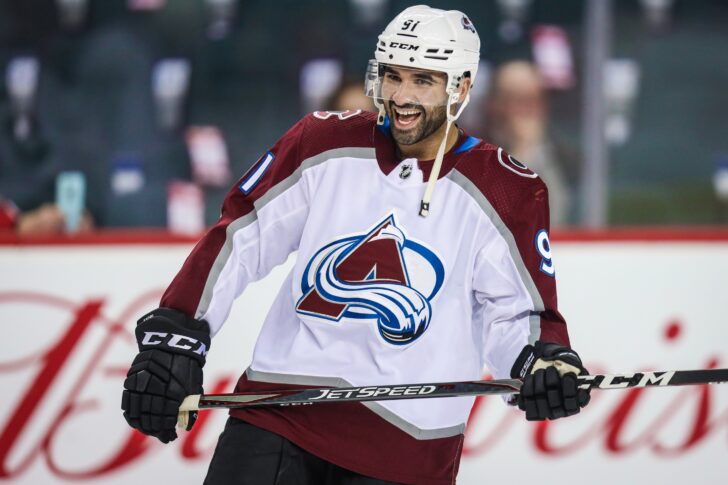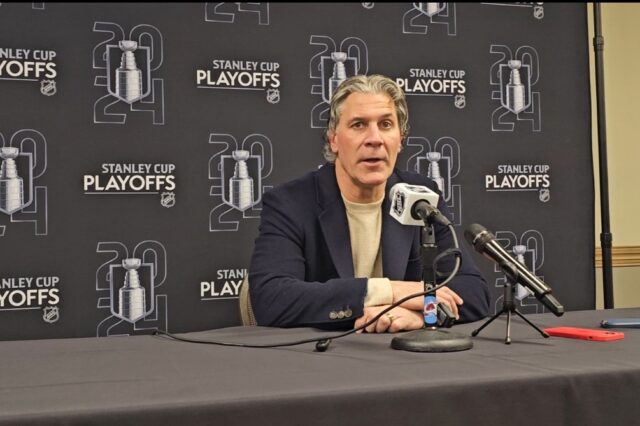I know what you’re thinking. You’ve read this story before. Because Avalanche center Nazem Kadri has talked to many hockey reporters over the years about his story. He has talked about where his love for the game of hockey originated from, his background, religion and all the other things that make him unique.
But I felt it was necessary for me to share his story with the hockey world because of my heritage and background, the similarities I share with Kadri. I, too, was born in Canada to Middle Eastern immigrants. And I’m also Muslim.
Similar to many young Canadians, Kadri had always dreamed of playing in the NHL. But what differentiates him from others is how his passion for hockey came to fruition.
Kadri was born in London, Ontario, to Lebanese parents. His father, Samir, immigrated to Canada in the 1960s with his siblings and Nazem’s grandparents. Samir quickly assimilated to the Canadian culture, most prominently through his passion for hockey.
His dreams of playing in the NHL were squashed, partly because of the costs associated with the game. But the biggest hurdle he faced was trying to play a game that was unfamiliar to his family and his country back home.
Now, Samir is able to live vicariously through his son, who wears his Lebanese background and Muslim heritage with pride.
“My father migrated to Canada at such a young age that hockey was a way for him to connect with friends and meet new people,” Kadri said. “He loved watching hockey when he came here. He was a big Canadiens fan, which at the time was the early 90s. That team was great, they won the Cup in 93 so I remember watching Hockey Night in Canada as a family and it just kind of brought all of us together. He introduced this game to me and I’ve loved it ever since.”
It does sound all too familiar.
Because my parents immigrated to Canada in the 1980s searching for a better life. Similar to Kadri’s grandparents, my mother and father quickly learned the language and did everything in their power to assimilate to the Canadian culture.
I was born nearly three years after Kadri, and my passion for hockey was the same as every other kid. I learned pretty quickly that playing hockey was never going to be an option—it just wasn’t feasible. My passion for the game quickly turned from telling my own story to telling the story of those that had the skill set required to make it to the NHL.
So here we are, 26 years later. I’m working my first job as an NHL reporter in Denver, where I was able to sit down with a proud Muslim NHL player to talk about how he brought his dream to life.
Now let’s get back to Kadri.
Kadri, 29, was traded to the Avalanche this summer after spending 10 years as part of the Toronto Maple Leafs organization. He was drafted No. 7 overall in 2009 by Toronto, accumulating 161 goals and 357 points in 561 games. His trade to Colorado caused a whirlwind of emotions for him—which amplifies his love not just for the city close to his childhood home, but for the team that became a part of his DNA.
“I spent a significant amount of time there and it’s all I kind of ever really knew,” he explained. “But you know I’m the type of person that no matter where I am or who I’m playing for I’m going to give the same effort and give the same passion and emotion that I’ve always played with. So you know that’s not going to change, whether here or in Toronto.”
It was an adjustment for Kadri after learning of the trade. But after making his way to Colorado, eventually bringing his family to explore the city, his mindset quickly shifted and the next chapter of his career was ready to be written.
“Everyone has been very supportive and welcoming, it made my transition a little easier,” Kadri told me. “I had the family come out the first couple weeks of the season. They got to check out my house and we got to do some family activities. So it was nice to see everybody.”
Kadri always knew that his family was his backbone. Perhaps one of the toughest pills to swallow about the trade was how far away he was going to be from them. Kadri has four sisters, who along with mom, dad, grandma, and grandpa, are all influential to his everyday life.
It wasn’t the first time he had to leave his family behind. But make no mistake, it never gets easier.
“They’ve always been my support system, without them I definitely wouldn’t be where I am now,” Kadri said. “I’ve battled a lot of adversity. Even moving away from home when I had just turned 15 years old. So that was pretty difficult. But you know how it is with family, they’ve always been there for me and have always been one phone call away. It didn’t matter where I was they would’ve been there the same day. So I’m very privileged to have them.”
I feel like I need to say something about that last quote because it truly does speak to me. I left my family behind in Dearborn, Michigan—home to the largest Middle Eastern and Muslim population outside of the Middle East—in order to live my dream as a hockey reporter.
I moved to Colorado to live the dream that, let’s face it, not many Arab-Americans and Arab-Canadians get to live.
Let’s not sugarcoat it, though. Leaving family behind is difficult. But knowing they’re always a phone call away makes it easier.
Enough about me, though. The story of Kadri is yet to be told.
Kadri misses many things about his family and being close to home. His favorite Middle Eastern foods are definitely high on that list.
“My grandmothers are in the kitchen 24/7, it’s just like the old school mentality,” Kadri told me. “I don’t know if you know any of those dishes but like, fitayir. It’s almost like a little pastry with meat in the center and bread around the outside. My grandmother is pretty notorious for making those.”
“And grape leaves. Those are some I really enjoy and miss. I always miss the family, I’m a very family-oriented person so, it sucks, but what are you going to do.”
Kadri literally tried to explain to me what fitayir was—and that’s honestly really cool. I didn’t have the heart to tell him that he was talking about my favorite breakfast dish, and one I truly miss about living at home. Mainly with my mother, who surprise, surprise, is in the kitchen 24/7 cooking up all the most glorious Middle Eastern meals for her kids and grandchildren.
And don’t even get me started on her grape leaves.
Kadri’s love for the Middle Eastern cuisine is so grand that during his time in Toronto he partnered with Paramount Fine Foods, a restaurant chain with 31 locations all over Ontario. The restaurant serves Halal meats, which similar to kosher meats in Judaism, is the only type of meat permitted for Muslims.
Paramount was able to attract an entirely new audience thanks to Kadri and his position within the hockey world. By using Kadri’s face on billboards and in advertisements, Paramount was able to continue to grow.
And with that growth came an opportunity for Kadri to share the food he grew up eating with his fellow players in the locker room.
“That was a nice connection to have. We wanted to help grow that restaurant brand,” Kadri said. “The owner was very gracious and generous and brought me along with the team. We thought we’d do a couple of fun things to get some attention to the fans and let people know about the culture and our food.”
“I used to bring lunch in all the time for all the boys in the dressing room and just kind of introduce them to that sort of cuisine. I got nothing but good reviews, so it was nice.”
Food was not the only part of the Lebanese culture that Kadri introduced to the hockey world.
In July 2018, Kadri married his longtime girlfriend Ashley in Toronto. The guest list included his Maple Leafs teammates. Kadri’s wedding was a true Lebanese wedding. It involved elegant decorations, a Lebanese singer, drummers, and Lebanese music and entertainment.
The wedding also included perhaps two of the most vital parts of a Lebanese wedding: The zaffee and the dabke.
The zaffee is an ancient Arab tradition that includes a musical procession, usually led by a singer, with drummers and dancers—often signifying the start of a wedding party. It is usually how the bride and groom are introduced to the audience.
The dabke is a folk dance made famous by the Lebanese people. It is the sign of a joyful occasion, combining circle dance and line dancing.
Kadri’s wedding involved both of these, and videos circulated on Twitter the morning after. The viral clips included Maple Leafs such as Mitch Marner, Jake Gardiner and Auston Matthews participating in the dabke, as well as the zaffee, where nearly the entire Maple Leafs team danced with Kadri and the rest of his family.
It was a fascinating part of his culture that Kadri was not shy about sharing with his teammates.
“I loved it, man, I really loved it,” Kadri said. “All the boys were loving it, too. So I think they really enjoyed embracing the culture. Like I said I’m a person that’s not afraid to step out of their comfort zone and I don’t get intimidated by too many things. So I was excited to show them the dance moves. They weren’t very good at it but they certainly tried their best.”
As a practicing Muslim, Kadri’s road to the NHL was faced with numerous obstacles that go beyond the dietary restrictions. He wasn’t shy about admitting his struggles with this at times, Always keeping the right intention in mind.
“You know putting culture and belief and religion aside, you’re still going to have some type of obstacles getting to the NHL,” he explained. “It’s hard enough as it is so you try to do what you can do. Not everything is going to be perfect. For all the people that know the culture, it’s all about the intention.”
Just like his father, whom he calls his biggest role model, Kadri is proud to be that same type of role model for aspiring hockey players of Middle Eastern descent.
“I feel proud—I’m a prideful person,” Kadri said. “My family is a very prideful family so we take it upon ourselves to make the game very diverse and if it just so happens to be my face as the face of that heritage then I’m definitely open for that. The youth development programs are so diverse and so multi-cultured now than back when I was playing. It’s very rewarding to see.”
“I try to be the best role model that I can be. Obviously I’m only human, I’ve made some mistakes and I’m not perfect by any means but one thing I am is accountable and I take responsibility for my actions and everything I do. I try to be responsible for it and I try to be someone the little kids can look up to.”
Similarly, NHL locker rooms have become just as multi-cultured and diverse. Kadri shares a locker room in Colorado with Frenchman Pierre-Edouard Bellemare, Russian Nikita Zadorov, Swede Gabe Landeskog and Czech Republic goaltender Pavel Francouz.
“In a locker room nowadays, nobody really makes you feel like there’s anything different,” Bellemare told me. “I don’t think of Naz, Z, or Francouz being different, they’re just three boys on the team.”
To this day, Kadri continues to receive messages from young Middle Eastern hockey players.
He recalls all the times he’s heard from children who started to play hockey because of him and is humbled by the outcome of what his successes have led to, even if it wasn’t something he had planned.
“People are taking time out of their day to reach out to me and tell me about their story,” he said. “But honestly I’m just a kid trying to fulfill my dream, too. In hindsight, I wasn’t really looking to be a role model but it just kind of unfolded to be that way and I’m proud of it.”
Whether it’s his family’s background, his religion, how he got into hockey, made it to the NHL, and became a fan favorite in Toronto and now, Denver, one thing Kadri certainly is and always will be is proud.
And for someone that has opened the doors for many, there is certainly no other way he should feel but exactly that.
Proud.



